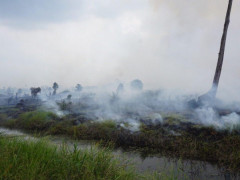Chapter 2: Updates After Two Years on the Central Kalimantan Food Estate Project.
By Diani Nafitri Cahyaningrum, Agiel Prakoso, Yoga AprilliannoSaving Wetlands from Exploitation—Both Legal and Illegal

Wetlands are still seen as barren lands ripe for exploitation rather than ecosystems in need of restoration. The celebration of World Wetlands Day, observed every February 2nd, has increasingly turned into nothing more than an empty slogan.
Several findings reinforce the fact that wetlands are shrinking at an alarming rate worldwide. The Global Wetland Outlook reports that wetland loss is occurring three times faster than natural forests. Meanwhile, according to the Ramsar Convention on Wetlands, 64% of the world's wetlands have vanished since the early 20th century.
The decline in high-quality wetlands is also evident in Indonesia. “As home to the world’s second-largest tropical peatlands, the state of wetland protection in Indonesia is, frankly, disheartening,” said Abil Salsabila, Campaigner at Pantau Gambut. The Omnibus Law has made it easier for corporate entities to legalize illegal oil palm plantations through land amnesty, affecting 407,267 hectares of Peatland Hydrological Units (PHU).
The poor treatment of peatland ecosystems has also heightened their vulnerability to forest and land fires. In early 2023, Pantau Gambut found that out of 24.2 million hectares of PHU in Indonesia, around 16.4 million hectares (65.9%) were at risk of burning. This issue is further exacerbated by restoration infrastructure that often fails to meet proper standards.
Abil added, “For the Indonesian government, restoration success is measured merely by project completion rates, not by its real impact on affected communities. Even World Wetlands Day has been reduced to nothing more than a ceremonial event.” On top of that, the status and authority of the Peatland and Mangrove Restoration Agency (Badan Restorasi Gambut dan Mangrove/BRGM) in executing restoration and conservation programs remain unclear.
Recommendations
Concrete actions must be taken to preserve wetland ecosystems for both present and future generations. As a state responsible for upholding its citizens’ right to a healthy and sustainable environment, Indonesia must, at the very least:
- Implement preventive measures through law enforcement in wetland ecosystems. This includes ensuring compliance with canal standards and groundwater table levels (Tinggi Muka Air Tanah/TMAT) as mandated in Article 23 of Government Regulation (PP) 56/2017 in conjunction with PP No. 71/2014.
- Revoke policies that are destructive to wetland ecosystems, such as palm oil amnesty, National Strategic Projects (Program Strategis Nasional/PSN), the revision of environmental protection laws (UU PPLH) under the Omnibus Law, and other harmful regulations.
- Enforce strict oversight on corporate responsibility within concession areas, ensuring regular and transparent sustainability commitments. Corporations must take full responsibility for their concessions and immediately address any damage to wetland ecosystems in accordance with established restoration standards. This includes comprehensive ecosystem recovery.
Abil concluded, "World Wetlands Day must not become a mere celebration to justify government projects that harm wetland ecosystems. One such looming threat: the conversion of 20 million hectares of forests into oil palm plantations."
Happy World Wetlands Day!



